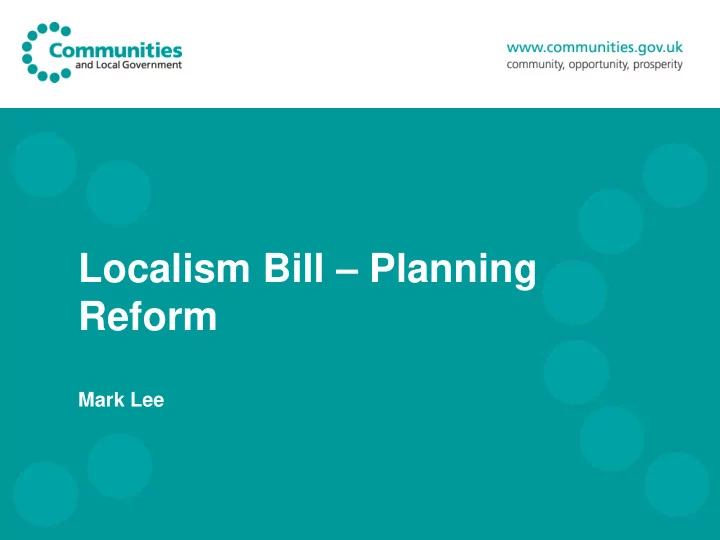

Localism Bill – Planning Reform Mark Lee
The Government’s vision Freedom, Fairness and Responsibility • Fundamental change in the relationship between citizens and the state. • Individuals and communities have more power and responsibility. • Freedom from top-down controls. • Extending transparency to every area of public life. 2
What it means for Planning Reform to achieve… • Greater democratic and local control • Rebalancing system in favour of sustainable development • Delivering a simpler and more effective system Delivering… A plan-led system that empowers local people to shape their surroundings whilst encouraging the idea that development can positively benefit a community. A system that is positive, proactive, simple, less adversarial and free from bureaucratic barriers. 3
But why? If it ain’t broke… We all know the planning system has problems, it: • is centralised, bureaucratic and complex – 3,254 new pages of guidance since 2005 alone; • is costly – over £2bn a year - 13 per cent more in real terms last year than five years ago - despite 32 per cent drop in applications received; • alienates and disempowers communities – many will seek to resist development regardless of the circumstances of the potential wider benefit; and • has failed to deliver - despite targets we have one of the lowest rate of house-building in the EC. Costs to the economy associated with delays in processing applications up to £3bn a year. 4
Planning Reform: Actions The vehicles at our disposal….. • The Localism Bill • Incentives to accept sustainable development • The Presumption in Favour of Sustainable Development • The National Planning Policy Framework • The Growth Review and subsequent changes to the system 5
The localism bill Made up of a number of interlinked policy themes with at least 40 policy areas Local Government Housing Community London Empowerment Planning
Non-planning measures Number of measures that have attracted attention from those with an interest in planning which are not planning measures per se: Pre determination Referendums Assets of community value General power of competence
The Localism Bill Key Planning elements … • Abolition of regional strategies • Duty to Cooperate • Local Plan reform • Neighbourhood planning • Reforming CIL • Pre application consultation • Enforcement • Major infrastructure (IPC) • Local finance considerations The Bill has now finished its Commons stages. Relatively consensual in Commons Committee, but some differences at Report. Lords Second Reading on 7 th June, Lords Committee provisionally scheduled to start on 20 th June. Royal Assent as soon as Parliamentary time allows. 8
Amendments – the Detail (1) Duty to Cooperate Strong signals at Commons Committee that clause should be strengthened, particularly to have some form of sanction for failure to cooperate. Worked closely with RTPI and a range of other bodies to bring forward amendments at Report which: • Included County Councils on the face of the Bill. • Ensures that the duty applies to the preparation of marine plans. • Emphasised that the duty relates to strategic cross boundary issues affecting at least two planning areas. • Included a requirement to consider whether to consult on, enter into and publish agreements on joint approaches, and consider the preparation of joint local plans • Links compliance with the duty to the independent examination of local plans. • Includes a power to enable LEPs to be prescribed as bodies to whom LPAs and others will have to have regard when preparing their local 9 plans.
Amendments – the Detail (2) Neighbourhood plans Much debate at Commons Committee, which particularly focussed on the accountability of the Neighbourhood Forum. Signalled our intent our to respond to a number of amendments. At Report stage brought forward amendments to: • Put on the face of the Bill criteria for the designation of neighbourhood forums which will include involvement of ward councillors and businesses; • Increase the minimum number of residents needed to form a neighbourhood forum from 3 to 21; • Specify that the membership of neighbourhood forums should be open to those living/wanting to live, working or operating a business premises in a neighbourhood area. Continued… 10
Amendments – the Detail (3) Neighbourhood plans continued… • Allow local planning authority and central government staff to act as Independent Examiners and introducing a charging power to allow for costs of acting as an Examiner to be recovered; • Allow for neighbourhood areas to cross local planning authority boundaries; • Put on the face of the Bill a new basic condition for all proposals for neighbourhood development orders and community right to build orders, which would prevent such orders resulting in substantial harm to or total loss of significance to the special architectural or historic interest of a listed building. 11
Amendments – the Detail (4) Local Finance Considerations Also brought forward New Clause 15 at Commons Report, which: - Does not seek to change the basis for making planning decisions; - Does seek to provide clarity that, where they are material to a planning application, local finance considerations (defined as Government grants, like NHB, or CIL) can be taken into account. - Reflects the fact the fact that there was uncertainty and doubt about this issue, which had been raised during the consultation on NHB. - We are clear we are not trying to provide greater weight to financial considerations in decision making. 12
Localism Bill – areas of debate Report Stage Wide range of issues raised at Commons Report stage, including: - Sustainable development - Third party rights of appeal - Permitted development – in particular betting shops and the demolition of pubs - Retail diversity - More flexibility in spending CIL Opposition signalled they did not think we’d gone far enough on the duty to cooperate and neighbourhood plans. Will continue to consider these issues, as well as points made about the business role in neighbourhood planning, the enforcement provisions and compulsory purchase compensation, amongst others. 13
Recommend
More recommend